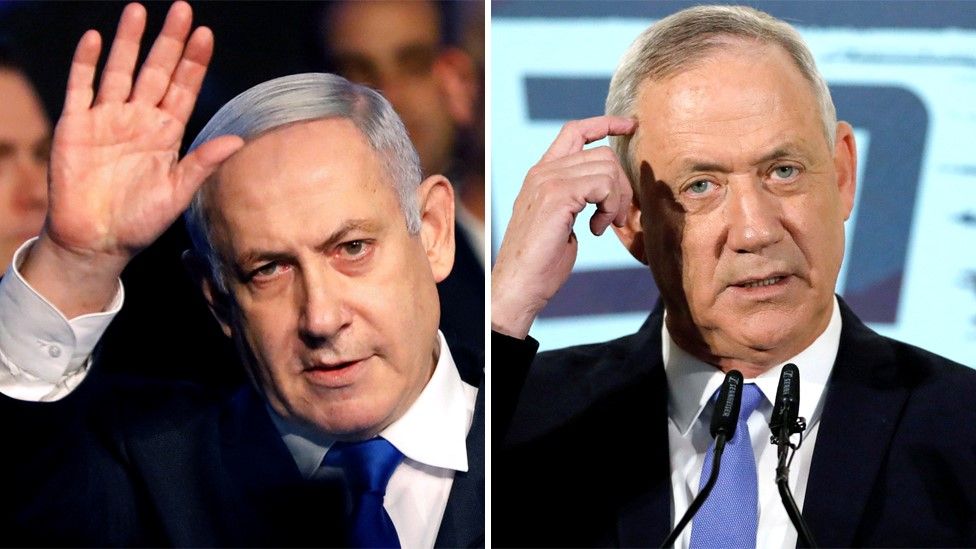Israel will hold unprecedented third election in a year
- Published

Israel will hold an unprecedented third general election in less than a year after politicians again failed to form a majority coalition in parliament.
Members of the Knesset voted to set the election date for 2 March hours after a midnight (22:00 GMT) deadline passed.
Prime Minister Benjamin Netanyahu and his main rival, Benny Gantz, were unable to secure majorities following September's inconclusive election.
The two leaders also could not agree on a power-sharing arrangement.
Mr Netanyahu's legal problems were a big obstacle to negotiations. He was indicted on corruption charges last month.
In the end, Mr Gantz demanded that he promise not to seek parliamentary immunity from prosecution as a precondition for further talks.
In September, Mr Gantz's centrist Blue and White alliance won 33 seats in the 120-member Knesset, while Mr Netanyahu's right-wing Likud party got 32 seats.
With neither party able to build a coalition that could command a 61-seat majority, President Reuven Rivlin called on them to form a national unity government.
But the negotiations broke down over who would serve as prime minister first; Mr Netanyahu's insistence that ultra-Orthodox parties allied to him be included; and Mr Gantz's refusal to serve under a prime minister facing criminal charges.
Israel's attorney general has charged with Mr Netanyahu with bribery, fraud and breach of trust in connection with three separate cases. He is alleged to have accepted gifts from wealthy businessmen and dispensed favours to try to get more positive press coverage.
The prime minister has denied any wrongdoing and described the charges as an "attempted coup", blaming them on a "tainted" process.
Mr Netanyahu has not yet announced whether he will ask parliament to grant him immunity from prosecution. But most analysts believe he is hoping to improve his chances of obtaining immunity with a third election.
Ahead of Wednesday's deadline for any member of the Knesset to form a majority coalition, the prime minister released a video accusing Blue and White of "creating a flood of political spin".
"They want to hide the fact that they did everything possible to avoid the establishment of a broad national unity government that would annex the Jordan Valley, apply Israeli sovereignty on the settlements in Judea and Samaria," he said, referring to the occupied West Bank.
"They forced new elections on us. It is unnecessary and in order to avoid it happening again there is one thing to do and that is to win, and win big - and that is what we'll do."
In response, Blue and White suggested on Twitter that Mr Netanyahu "save a few lies for the campaign".
Yair Lapid, Mr Gantz's deputy, earlier told a debate in the Knesset: "What used to be a celebration of democracy has become a moment of shame for this building."
"There are only three reasons for this election - bribery, fraud and breach of trust."
It is not clear if another election will break the deadlock. An opinion poll published by Israel's Channel 13 News on Tuesday suggested that Blue and White would win 37 seats and Likud 33 seats.
Mr Netanyahu will also face a challenge from within Likud, which said on Wednesday that it was likely to hold a leadership primary on 26 December.
Former Interior Minister Gideon Saar, who intends to stand, tweeted: "There is a national need for a breakthrough that will end the ongoing political crisis, enable the formation of a strong government, and to unite the people of Israel."
- Published22 November 2019
- Published21 November 2019
- Published21 November 2019
- Published22 May 2020
- Published20 November 2019
- Published21 October 2019